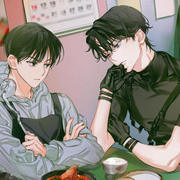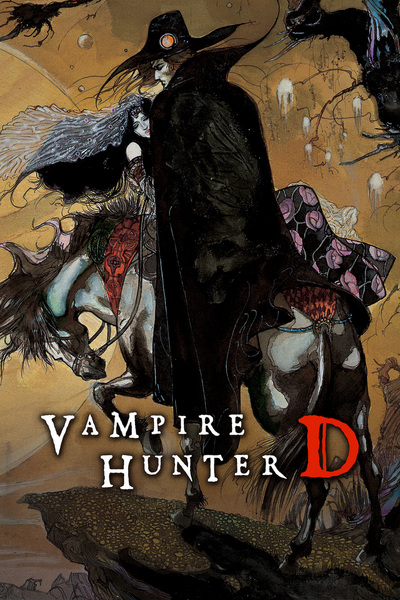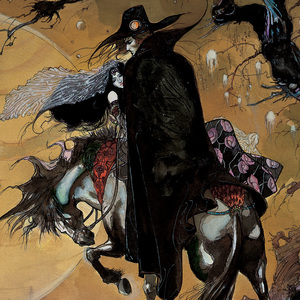Is he one of those? A dhampir?
Garou realized he’d finally run into a real opponent.
“Your guard is wounded,” D said softly, turning to the young lady. “If he doesn’t come at me again, he might live to a ripe old age. You might, too. Go home and tell your father a dangerous obstacle has cropped up. And that he’d be a fool to attack this farm again.”
“Silence!” the young lady screamed, her gorgeous visage becoming that of a banshee. “I am Larmica, daughter of Count Magnus Lee, the ruler of the entire Ransylva district of the Frontier. Do you think I can be bested by the likes of you and your sword?”
Before she’d finished speaking, a streak of white light shot toward her breast from D’s left hand. In fact, it was a foot-long needle he’d taken out at some point and thrown faster than the naked eye could follow. It was made of wood. As it traveled at that unfathomable speed, the needle burned from the friction of the air, and the white light was from those flames.
But something odd had happened.
The flames had come to a stop in front of D’s chest. Not that the needle he’d thrown had simply stopped there. The instant it was about to sink into Larmica’s breast, it had turned around and come back, and D had stopped it with his bare hand. Or to be more accurate, Larmica had caught the needle with superhuman speed and thrown it back just as quickly. The average person wouldn’t even have seen her hand move.
“If the servant is no more than a servant, still the master is a master. Well done,” D murmured, heedless of the flaming needle in his hand or the way it steadily scorched his naked flesh. “For that display of skill you get my name. I’m the Vampire Hunter D. Remember that, should you live.” As he spoke, D sprinted for the young lady without making a sound.
Terror stole into Larmica’s expression. In a twinkling, the distance between them closed to where she was within sword’s length of him, and then—
“Awoooooooooh!”
A ferocious howl shook the night air, and an indigo flash of light shot from the coachman’s perch on the carriage. D dove to the side to dodge it, only able to escape the beam because his superhuman hearing had discerned the sound of the laser cannon on the perch swiveling to bear on him. The beam pierced the hem of his overcoat, igniting it in pale blue flames. Presumably, the cannon was equipped with voice recognition circuits and an electronic targeting system that responded to Garou’s howls. Avoiding the flashes of blue that flew with unerring accuracy to wherever he’d gone to dodge the last, D had no choice but to keep twisting through the air.
“Milady, this way!”
He heard Garou’s voice up in the driver’s seat. There was the sound of a door closing. As D attempted to give chase, another blast from the laser cannon checked his advance, and the carriage swung around and was swallowed by the darkness.
“I’ll settle with you another day, wretch, mark my words!”
“You’ll not soon forget the wrath of Nobility!”
Whether he was pleased at having staved off the enemy or perturbed he hadn’t managed to put an end to the vampiress, D wore no emotion on his face as he rose expressionless from the bushes, the malice-choked parting words of the pair circling him endlessly.
People on the Frontier
The year is A.D. 12,090.
The human race dwells in a world of darkness.
Or perhaps it might be more accurate to call it a dark age propped up by science. All seven continents are crisscrossed by a web of super-speed highways, and at the center of the system sits a fully automated “cyber-city” known as the Capital, the product of cutting-edge scientific technology. The dozen weather controllers manipulate the climate freely. Interstellar travel is no longer a far-fetched dream. In vast spaceports, hulking matter-conversion rockets and ships propelled by galactic energy stare up at the empyrean vault, and exploration parties have actually left their footprints on a number of planets outside our solar system—Altair and Spica, to name just two.
However, all of that is a dream now.
Take a peek at the grand Capital. A fine dust coats the walls of buildings and minarets constructed from translucent metal crystal; in places you’ll find recent craters large and small from explosives and ultraheat rays. The majority of automated roads and maglev highways are in shambles, and not a single car remains to zip from place to place like a shooting star.
There are people. Tremendous mobs of them. Flooding down the streets in endless numbers. Laughing, shouting, weeping, paying their respects to the Capital, the melting pot of existence with a vitality that borders on complete chaos. But their garb isn’t what you’d expect for the masters of a once-proud metropolis. Men don shabby trousers and tunics redolent of the distant Middle Ages, and threadbare cassocks like a member of a religious order might wear. Women dress in dim shades and wear fabric rough to the touch, completely devoid of flamboyance.
Through the milling crowd of men armed with longswords or bows and arrows comes a gasoline-powered car most likely taken from some museum. Trailing black smoke and popping with the firecrackers of backfires the vehicle carries along a group of laser-gun toting lawmen.
A dreadful scream rises from one of the buildings and a woman staggers out. From her inhuman cry people instinctively know the cause of her terror, and call out for the sheriff and his men. Before long, they race to the scene, ask the wailing woman where the terror is located, and enter the building in question with faces paler than the bloodless countenance of the witness herself. They ride an independently powered elevator down five hundred stories.
In one of the subterranean passageways—all of which had supposedly been destroyed ages ago—there’s a concealed door, and beyond it a vast graveyard where the Nobility, blood-craving creatures of the night, slumber as in days gone by in wooden coffins filled with damp soil.
The sheriff and his men soon go into action. Fortunately, it seems there are no curses or vicious beasts here, no defense system of lasers or electronic cannons. These Nobles were probably resigned to their fate. The lawmen hold rough wooden stakes and gleaming metal hammers in their hands. Their expressions are a pallid blend of fear and sinfulness. The mob of black silhouettes encircles a coffin, someone’s arm rises toward the heavens then knifes back down. There’s a dull thud. A horrifying scream and the stench of blood fill the graveyard.
The anguished cry grows thinner and dies out, and the group moves on to the next coffin.
When the lawmen leave the graveyard not long after that, their faces are adorned with crimson beads of blood and a shade of sinfulness much deeper than the one they wore before this mission.
Though the Nobility was nearly extinct, the feelings of pride brought on by the awe humanity held toward them had seeped into their very blood over the course of ten long millennia and would not be shaken off so easily. Because they had indeed reigned supreme over the human race. And because the automated city—now populated by people who couldn’t fathom its machinery or receive the tiniest fraction of the benefits it might provide—and everything else in the world that could be called civilization was something they had left behind. They—the vampires.
***
This strict stratification of vampires and humanity came about when one day in 1999 mankind’s history as lords of the earth came to an abrupt end. Someone pushed the button and launched the full-scale nuclear war that the human race had been warned about for so long. Thousands of ICBMs and MIRVs flew in disarray, reducing one major city after another to a white-hot inferno, but the immediate fatalities were far outstripped by the wholesale death dealt by radiation more potent than tens of thousands of x-rays.
The theory of a limited nuclear war, where sensible battles would be fought so the winners might later rebuild and rule, was obliterated in a split second by a million degrees of heat and flame.
The survivors barely made it. Their numbers totally insignificant, they shunned the surface world and its toxic atmosphere and were left with no choice but to live in underground shelters for the next few years.
When they finally returned to the surface, their mechanized civilization was in ruins. With no way of contacting survivors in other countries, any thoughts these isolated pockets of humanity might have had of things returning to the way they’d been before the destruction, or even of rebuilding to the point where it could be called a civilization, were flights of fantasy, and nothing more.
The regression began.












Comments (7)
See all